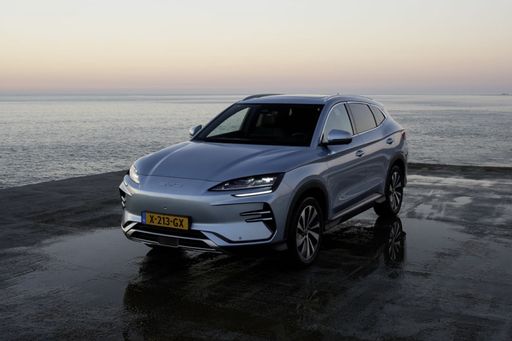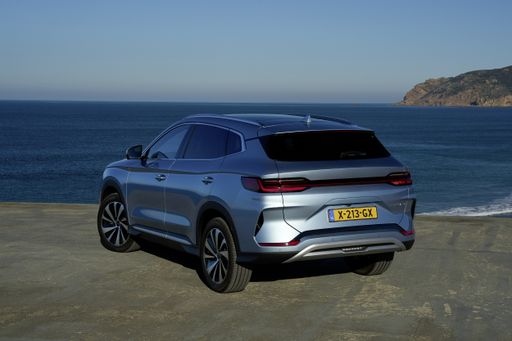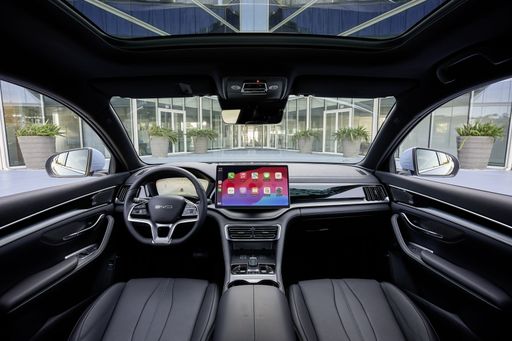BYD Seal U VS VW Tiguan
In the competitive crossover segment, the BYD Seal U stands out with its sleek design and impressive electric range, making it a compelling option for eco-conscious buyers. On the other hand, the VW Tiguan offers a well-rounded package with its refined interior, advanced technology features, and robust performance, appealing to those seeking a versatile family vehicle. Ultimately, the choice between these two models will depend on prioritizing sustainability or traditional driving dynamics.
BYD Seal U
The BYD Seal U presents itself as a sophisticated addition to the electric vehicle market, blending sleek design with cutting-edge technology. Its modern aesthetic is complemented by a spacious interior, offering both comfort and functionality for drivers and passengers alike. With advanced features prioritising sustainability and performance, it represents a bold step forward in eco-friendly motoring.
detailsVW Tiguan
The VW Tiguan presents itself as a versatile and practical option in the SUV market, combining a stylish design with a spacious and comfortable interior. It offers a smooth driving experience, making it well-suited for both urban environments and longer journeys. With its focus on safety and innovative technology features, the Tiguan remains a compelling choice for families and adventurers alike.
detailsBYD Seal U vs. VW Tiguan: A Tech-Driven Showdown
The automotive landscape is evolving rapidly, with electric and hybrid vehicles redefining the future of mobility. Among the frontrunners in this trend are the BYD Seal U and the VW Tiguan, both presenting themselves as robust SUV options but with contrasting technologies and innovations. Let’s dive into a detailed comparison of these two dynamic contenders.
Powertrain and Performance
The BYD Seal U offers a choice between a Plugin Hybrid and an all-electric variant. It boasts a powerful electric motor producing between 160 kW (218 hp) and 238 kW (324 hp) with torque figures ranging from 300 to a remarkable 550 Nm, facilitating thrilling acceleration from 0-100 km/h in as little as 5.9 seconds. Its electric range is also impressive, going up to 500 km on a single charge, making it suitable for long-distance travels.
In contrast, the VW Tiguan provides a broader engine lineup, including petrol MHEV, diesel, and hybrid variants. Power outputs span from 130 hp to 272 hp, accommodating a diverse consumer base while maintaining competitive torque figures of up to 400 Nm. Acceleration for the Tiguan ranges from 5.9 seconds to 10.6 seconds, appealing to drivers who seek efficiency as well as performance. However, its electric range is notably shorter, capped at around 113 km for the hybrid variants.
Fuel Efficiency and Emissions
When it comes to fuel efficiency, the BYD Seal U shines brightly in both hybrid and fully electric formats. It achieves a remarkable consumption rate of only 0.9 L/100 km for hybrid models and 19.9 kWh/100 km for its electric variant. The CO2 emissions are equally impressive, with ratings of 0 g/km for the all-electric version and 20 g/km for hybrids, placing it in the A and B efficiency classes.
In comparison, the VW Tiguan offers variable fuel consumption around 5.3 to 8.5 L/100 km, demonstrating solid performance but trailing behind BYD's figures. Its CO2 emissions range more widely, with figures like 9 g/km for its most efficient hybrid version, showing that while the Tiguan provides adaptable options, it does not hit the same low-emission marks as the Seal U.
Interior and Comfort
Both vehicles seat five passengers comfortably, but the BYD Seal U provides varying trunk capacities of 425 L to 552 L based on configuration, allowing for generous cargo space. Its dimensions, measuring 4775 mm in length and 1890 mm in width, indicate a robust and spacious interior layout. The Seal U is well-equipped with modern tech features tailored for convenience and entertainment.
The VW Tiguan, while slightly shorter at 4539 mm, compensates with a maximum trunk capacity of 652 L, making it one of the most versatile SUVs in its segment. The interior design focuses on quality materials and usability, complemented by an intuitive infotainment system that many VW enthusiasts appreciate. With luxury and practicality in mind, the Tiguan often feels like a step up in terms of craftsmanship.
Safety Technologies
Safety is paramount in both the BYD Seal U and the VW Tiguan. The Seal U is equipped with advanced driver assistance systems, featuring autonomous emergency braking, lane departure warning, and adaptive cruise control. These innovations aim to enhance driver confidence and occupant safety, creating a futuristic driving experience.
The Tiguan is recognized for its robust safety credentials, receiving high marks in crash tests and offering a comprehensive suite of safety features, including adaptive cruise control, lane assist, and a blind spot monitoring system. Volkswagen’s commitment to safety ensures that the Tiguan remains a favorite for families and safety-conscious consumers.
Conclusion: Which SUV Reigns Supreme?
Choosing between the BYD Seal U and the VW Tiguan ultimately depends on consumer priorities. If you want cutting-edge electric technology with low emissions and spacious interiors, the Seal U is the clear frontrunner. However, if you prioritize versatility, driving dynamics, and a premium feel, the Tiguan may better suit your needs. Both models showcase the ongoing evolution in the automotive industry, where innovation meets consumer demand.
 @ press.bydauto.be
@ press.bydauto.be
 @ press.bydauto.be
@ press.bydauto.be
 @ press.bydauto.be
@ press.bydauto.be
 @ Volkswagen
@ Volkswagen
 @ Volkswagen
@ Volkswagen
 @ Volkswagen
@ Volkswagen
 @ Volkswagen
@ Volkswagen
 @ Volkswagen
@ Volkswagen
 @ Volkswagen
@ Volkswagen

|

|
|
|
|
Costs and Consumption |
|
|---|---|
|
Price
about 33300 - 38600
£
|
Price
about 32800 - 51000
£
|
|
Consumption L/100km
0.9 - 1.2
L
|
Consumption L/100km
0.4 - 8.5
L
|
|
Consumption kWh/100km
19.9 - 20.5
kWh
|
Consumption kWh/100km
-
|
|
Electric Range
70 - 500
km
|
Electric Range
112 - 113
km
|
|
Battery Capacity
-
|
Battery Capacity
19.7
kWh
|
|
co2
20, 0, 26
g/km
|
co2
8 - 193
g/km
|
|
Fuel tank capacity
60
L
|
Fuel tank capacity
45 - 58
L
|
Dimensions and Body |
|
|
Body Type
SUV
|
Body Type
SUV
|
|
Seats
5
|
Seats
5
|
|
Doors
5
|
Doors
5
|
|
Curb weight
1940 - 2147
kg
|
Curb weight
1598 - 1890
kg
|
|
Trunk capacity
425 - 552
L
|
Trunk capacity
490 - 652
L
|
|
Length
4775 - 4785
mm
|
Length
4539
mm
|
|
Width
1890
mm
|
Width
1842 - 1859
mm
|
|
Height
1668 - 1670
mm
|
Height
1656 - 1658
mm
|
|
Payload
410
kg
|
Payload
467 - 533
kg
|
Engine and Performance |
|
|
Engine Type
Plugin Hybrid, Electric
|
Engine Type
Petrol MHEV, Plugin Hybrid, Diesel, Petrol
|
|
Transmission
Automatic
|
Transmission
Automatic
|
|
Transmission Detail
CVT, Reduction Gearbox
|
Transmission Detail
Automat. Schaltgetriebe (Doppelkupplung)
|
|
Drive Type
Front-Wheel Drive, All-Wheel Drive
|
Drive Type
Front-Wheel Drive, All-Wheel Drive
|
|
Power HP
218 - 324
HP
|
Power HP
130 - 272
HP
|
|
Acceleration 0-100km/h
5.9 - 9.6
s
|
Acceleration 0-100km/h
5.9 - 10.6
s
|
|
Max Speed
170 - 180
km/h
|
Max Speed
198 - 242
km/h
|
|
Torque
300 - 550
Nm
|
Torque
220 - 400
Nm
|
|
Number of Cylinders
4
|
Number of Cylinders
4
|
|
Power kW
160 - 238
kW
|
Power kW
96 - 200
kW
|
|
Engine capacity
1497 - 1498
cm3
|
Engine capacity
1498 - 1984
cm3
|
|
Top speed
170 - 180
km/h
|
Top speed
198 - 242
km/h
|
General |
|
|
Model Year
2024
|
Model Year
2024
|
|
CO2 Efficiency Class
B, A
|
CO2 Efficiency Class
E, B, F, G
|
|
Brand
BYD
|
Brand
VW
|
BYD Seal U
An Introduction to the BYD Seal U
The BYD Seal U is a groundbreaking entrant in the automotive market, serving as a testament to the brand's commitment to innovative sustainable mobility solutions. Designed as an eco-friendly SUV, the Seal U is available in both Plug-In Hybrid and fully Electric variants, providing consumers with choices that align with their driving habits and environmental concerns.
Innovative Powertrains and Performance
At the heart of the BYD Seal U lies its forward-thinking powertrains. The Plug-In Hybrid model combines a finely tuned 1497 - 1498 cm³, 4-cylinder engine with an electric motor to deliver a total power output of up to 324 PS. The hybrid system is capable of achieving a frugal 0.9 - 1.2 litres per 100 km fuel consumption, though it does not compromise on performance with an impressive acceleration from 0 to 100 km/h in 5.9 - 9.6 seconds.
In the fully Electric variant, the Seal U boasts a substantial performance with up to 238 kW of power, ensuring a brisk ride while providing a clean and silent driving experience. With two battery options offering ranges from 420 km to an expansive 500 km, this electric SUV proves to be a formidable contender for those who prioritise long-distance electric mobility.
State-of-the-Art Design and Comfort
The Seal U's design embodies a sophisticated blend of style and function. Its commanding SUV silhouette, measuring between 4775 - 4785 mm in length, conveys both elegance and robustness. Inside, the vehicle offers room for five passengers, ensuring comfort with plush seating and a spacious interior that's accentuated by advanced ergonomic design and quality materials.
The boot space ranges from 425 to 552 litres, accommodating the demands of family trips or sizable grocery hauls with ease. In terms of technology, the Seal U does not disappoint, featuring an intuitive infotainment system that connects seamlessly with mobile devices, ensuring entertainment and connectivity on the go.
Advanced Safety Features
Safety is paramount for BYD, and the Seal U incorporates a suite of advanced safety technologies to protect its passengers. Systems such as adaptive cruise control, lane-keeping assist, and automatic emergency braking work in concert to enhance the driving experience while providing peace of mind. These features are complemented by a robust body structure designed to absorb and dissipate impact energy efficiently.
Environmentally Conscious Engineering
The BYD Seal U sets a new standard in eco-friendly automotive design. Its Plug-In Hybrid and Electric models both earn impressive CO2 efficiency ratings, ranging from class A to B, thanks to technologies that significantly reduce emissions. Additionally, its Plug-In Hybrid system enables an all-electric range up to 80 km, allowing for short day-to-day trips purely on electric power and making it an ideal choice for environmentally conscious drivers.
Pricing and Model Year
The BYD Seal U is accessible to a wide range of budgets with prices beginning at €38,900 and extending to €44,990, depending on specifications and chosen trim levels such as Boost CVT, Comfort, Design, and Design AWD CVT. As we look to the future, the 2024 model year is poised to continue BYD's tradition of excellence, bringing advanced engineering and sustainable practices to drivers eager for innovation and efficiency.
VW Tiguan
Introducing the VW Tiguan: A Blend of Style and Innovation
The VW Tiguan has consistently been a popular choice among SUV enthusiasts, combining practicality with a touch of elegance. In the latest iteration, Volkswagen has continued this tradition with a range of technical updates and innovations.
Powertrains: Versatility Meets Efficiency
The VW Tiguan comes with a variety of engine options, catering to different preferences and needs. From the efficient petrol mild-hybrid variants to the environmentally friendly plug-in hybrids, and the robust diesel engines, there is something for everyone. The power output ranges from a modest 130 PS to an impressive 272 PS, ensuring that drivers can enjoy a powerful and dynamic driving experience.
Innovation remains at the heart of the Tiguan’s engineering. The plug-in hybrid models, for example, boast an electric range of up to 113 km, making them ideal for those looking to reduce their carbon footprint while still enjoying the flexibility of a traditional engine.
Advanced Transmission and Drivetrain
Equipped with a smooth and responsive automatic transmission, the Tiguan ensures a comfortable drive. The dual-clutch gearbox provides quick and seamless gear changes, enhancing the driving experience. Additionally, the Tiguan is available in both front-wheel and all-wheel drive configurations, offering excellent traction and stability across different driving conditions.
Performance and Efficiency
The Tiguan's performance capabilities are complemented by its efficiency. With fuel consumption as low as 0.4 L/100km for hybrid models, owners can enjoy long trips with fewer stops for refuelling. The CO2 emissions are also impressively low, aligning with modern environmental standards and expectations.
Design and Dimensions
The Tiguan’s aesthetic appeal is undeniable, with a robust character that exudes confidence and sophistication. Its dimensions—4,539mm in length, 1,842 to 1,859 mm in width, and up to 1,658mm in height—provide ample interior space, making it a versatile vehicle for families and adventure seekers alike.
Practicality is further emphasised by its sizeable boot space, ranging from 490 to 652 litres, ensuring plenty of room for luggage or shopping.
Safety and Technology
Volkswagen has not compromised on safety or technology. The Tiguan is equipped with the latest driver assistance systems, ensuring a safe journey for its occupants. Features like adaptive cruise control, lane assist, and emergency braking provide an extra layer of protection.
Pricing and Value
Starting from €38,250 to €59,535, the Tiguan offers a range of specifications and features to match different budgets. When considering the advanced technology, engine options, and the premium feel of the cabin, it presents excellent value for money.
Conclusion: The Ultimate SUV Experience
The VW Tiguan continues to impress with its blend of innovative technology, performance, and practicality. Whether you’re looking for an eco-friendly hybrid with a long electric range or a powerful diesel for longer hauls, the Tiguan provides an all-encompassing solution. With its refined design and superior comfort, it remains a leading choice in the SUV segment.
